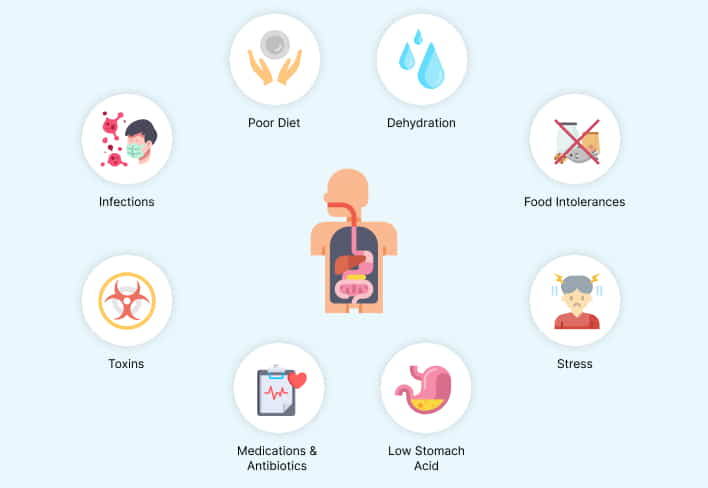We learn about the five sense organs and how important they are at school. It is just as important that we learn from a young age about the important role that our gut plays in our overall health. The gut does not just deal with digestion of food. 70% of our immune system is in the gut. Gut health is directly linked to how effectively our body can prevent harmful bacteria and toxins from entering our body.
The gut is also known as our second brain as it has its very own nervous system which is known as the enteric nervous system. There is a strong connection between the brain and the gut. Any imbalance in the gut affects the brain and vice versa. Hence if your gut is unhealthy, it has an impact on your physical, emotional and mental health.
How do we know if our gut is healthy?
The gut is home to trillions of bacteria, and they are collectively known as the gut microbiome. There are 3 types of gut bacteria – beneficial bacteria, harmful bacteria and opportunistic bacteria. Beneficial gut bacteria control inflammation, improve digestion, prevent weight gain and help maintain the integrity of the gut lining. Harmful gut bacteria like staphylococcus cause intestinal putrefaction and promote the production of harmful toxins and intestinal gas. Opportunistic bacteria do not affect you when you are healthy but team up with harmful bacteria to cause intestinal damage when there is gut imbalance.
The balance between good and bad bacteria in our gut is very delicate. When this balance is disturbed, it is seen externally in the form of issues like acne and internally in the form of digestive issues like bloating, constipation and other digestive disorders. Chronic gut inflammation in the long term can lead to more than 40 diseases including diabetes, heart disease, IBS, anxiety and osteoarthritis.Thus, it is important to check on our gut flora on a regular basis.
The easiest way to find out if there is any imbalance or dysbiosis in our gut is to take a simple at-home test like the Gut Microbiome test from Bione. It takes just 10 minutes and the results provide you with a comprehensive overview of your gut health.
If you have any of the following symptoms, we would encourage you to take a Gut Test as soon as possible.
Some signs that indicate you have poor gut health

- Poor digestion and digestive issues: These include symptoms like heartburn, constipation, diarrhea, bloating, stomach pain and hemorrhoids. Over the long term, these symptoms can develop into serious conditions like IBD (Inflammatory Bowel Disease) and Irritable Bowel Syndrome (IBS). Hence, you cannot afford to ignore them.
- Fatigue: Most of us tend to ignore tiredness. We put it down to the stress and anxiety we face on a daily basis. But if you are suffering from chronic fatigue, your poor gut health could possibly be one cause. A study done in April 2017 found that almost 50% of those who had chronic fatigue syndrome also had IBD pointing to gut issues.
- Food cravings: Are you one of those who experiences a craving for chocolate or salty snacks on a regular basis? It could be due to your food habits. Eating too much sugar for example can feed bad bacteria in your gut. Changing your gut microbiome through smarter diet choices may help you control these cravings.
- Sudden weight gain: In recent years, most of us have switched from a diet that had plenty of fruits and vegetables to one that is low in fibre and high in sugar and processed foods. This starves the beneficial bacteria and feeds the harmful bacteria adversely affecting our metabolism. With a slower metabolic rate, the body struggles to absorb nutrients and instead stores food as fat. This change in food habits has been linked to growing rates of obesity across the globe.
- Skin irritation: Many studies have established a strong link between imbalance in the gut and skin problems like acne, eczema and psoriasis. A poor diet can cause gut inflammation and can cause increased “leaking” of certain proteins out into the body, which irritate the skin leading to skin conditions.
- Food sensitivities: If you experience stomach discomfort after taking foods containing gluten like bread or after drinking milk, you might need to check your gut health. Poor quality of the bacteria in your gut can trigger such sensitivities leading to symptoms like bloating, gas, diarrhea, nausea, and abdominal pain.
- Anxiety and mood swings: Studies published in reputed journals like “Clinics and Practice” have found a strong link between brain and gut health. It is believed that anxiety and depression could be potentially triggered by gut disturbances. Again, getting a gut test from Bione and taking corrective measures could help.
- Sleep disturbances: One reason why you have a disturbed sleep could be poor digestion and an unhealthy gut. 95% of the body’s serotonin which is known as the “happy hormone” is made in the gut. When serotonin production is adversely affected by poor gut health, it affects our moods and sleep.
- Migraines: If you get frequent migraines, it might be a sign that you need to check on your gut health. Studies have found that there is a higher prevalence of migraines among those who have gastrointestinal symptoms like constipation and reflux disease.
- Bad breath: Have ongoing bad breath that brushing can’t seem to fix? That is another sign that you may have excess bad bacteria in your gut. You will have a fair idea about your gut health once you get your test results. Even if your gut health score is low, there is little cause for worry. There are many factors that affect our gut health including our genetic traits and how our body is built. To a large extent though, it is our diet that has an impact on our gut and the bacteria in our gut. When you get a gut microbiome test from Bione, the experts there will provide you with a personalized diet that you can follow to restore your gut to a healthy state. They will tell you, based on your unique gut microbiome, exactly which foods you need to consume and which ones you need to avoid to achieve optimal health. Over a period of 3 to 4 months, as you change your diet, your gut microbiome will also change. Healthy gut bacteria will thrive as you eat foods that feed them. Once you have removed the offending foods, you will soon see your digestive symptoms clearing up. The benefits include better mood, stronger immunity, clearer skin and higher energy levels. A gut test followed by a tailored diet might be just the catalyst you need to succeed in your wellness journey.



